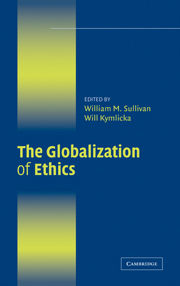Book contents
- Frontmatter
- Contents
- Contributors
- Acknowledgments
- 1 Introduction: The Globalization of Ethics
- 2 Global Ethics and the International Law Tradition
- 3 Morality and Universality in Jewish Thought
- 4 Globalization and Christian Ethics
- 5 Buddhism and the Globalization of Ethics
- 6 Muslim Perspectives on Global Ethics
- 7 Confucianism: Ethical Uniformity and Diversity
- 8 Natural Law, Common Morality, and Particularity
- 9 Liberalism and the Globalization of Ethics
- 10 Feminist Perspectives on a Planetary Ethic
- 11 Ethical Universalism and Particularism: A Comparison of Outlooks
- Appendix: Key Documents on Global Ethics
- Bibliography
- Index
6 - Muslim Perspectives on Global Ethics
Published online by Cambridge University Press: 03 September 2009
- Frontmatter
- Contents
- Contributors
- Acknowledgments
- 1 Introduction: The Globalization of Ethics
- 2 Global Ethics and the International Law Tradition
- 3 Morality and Universality in Jewish Thought
- 4 Globalization and Christian Ethics
- 5 Buddhism and the Globalization of Ethics
- 6 Muslim Perspectives on Global Ethics
- 7 Confucianism: Ethical Uniformity and Diversity
- 8 Natural Law, Common Morality, and Particularity
- 9 Liberalism and the Globalization of Ethics
- 10 Feminist Perspectives on a Planetary Ethic
- 11 Ethical Universalism and Particularism: A Comparison of Outlooks
- Appendix: Key Documents on Global Ethics
- Bibliography
- Index
Summary
It was probably in 1996 that Professor Riffat Hassan first introduced me to the debate on Global Ethics. The idea was attractive, but I felt reluctant to participate for two reasons. These same two reasons continue to inhibit my enthusiasm for the subject even today. First, I find it problematic to represent Islam or Muslims because no one can speak on behalf of all Muslims or can authoritatively represent Muslims or Islam. This problem is apparent in interfaith dialogue. Dialogues between Muslims and other religious communities falter because while the other religious communities may be represented by their institutional authorities (Sunni) Muslims have no equivalent institutionalized or official religious authority. Muslim religious scholars (Ulama), who are often considered as religious authorities, enjoy no such official position in fact. Various modern organizations, such as Islamic Councils, which also claim to be representatives of Islam, have no official position.
Furthermore, it is not only a question of the absence of institutionalized religious authority, but also one of representation. Genuine representation is not feasible because there is such a wide range of diversity present in religious beliefs and practices among Muslims for example, between the Shi'a and the Sunnis, the two main sects in Islam. There is also such a plurality of opinions among Muslim thinkers and intellectuals on current issues that no one person or group can truly claim to represent the range of Muslim thought and opinion and negotiate on behalf of the community as a monolithic body.
- Type
- Chapter
- Information
- The Globalization of EthicsReligious and Secular Perspectives, pp. 93 - 116Publisher: Cambridge University PressPrint publication year: 2007
- 1
- Cited by



